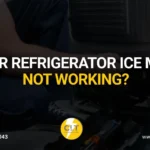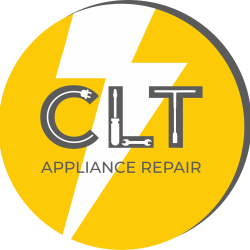[TL;DR]
Your washing machine displays warning signs before it breaks down completely. Watch for water leaks, strange noises, spinning problems, and error codes. Immediate action prevents costly water damage and expensive repairs.
- Most urgent signs: Water leaks, electrical issues, persistent error codes, etc.
- DIY checks: Redistribute clothes, clean filters, check hoses
- Professional help needed: Motor problems, drum bearing issues, electrical faults
- Cost consideration: Machines over 10 years old may need replacement instead of repair
Your washing machine works hard every day, handling load after load of dirty clothes. When it starts showing problems, ignoring them can lead to flooded laundry rooms, damaged floors, and expensive emergency repairs. Washing machine repair becomes urgent when certain warning signs appear, and catching these early saves both money and hassle.
Professional appliance repair becomes necessary when basic troubleshooting fails. Washing machines and dryers are repaired at a success rate of between 80 and 90% when brought to professional service centers. Modern washing machines contain complex electronic systems, motor assemblies, and water management components that require specialized knowledge to diagnose and repair properly. Knowing when to call experts versus attempting DIY fixes prevents further damage and keeps your family’s laundry routine running smoothly.
Expert washing machine diagnostics identify problems within minutes. Our technicians provide comprehensive repair solutions that prevent future breakdowns.
[Book Free Inspection: 704-606-9043]
What Are the Most Critical Warning Signs That Require Immediate Repair?
Water leaks, electrical malfunctions, and persistent mechanical failures represent the most urgent washing machine problems requiring immediate professional intervention to prevent property damage and safety hazards.
The following warning signs indicate serious problems that can worsen rapidly without prompt attention. Each symptom represents specific component failures that trained technicians can diagnose and repair efficiently.
1. Leaking Water
Water leaks require immediate attention to prevent property damage.
Leaks typically come from damaged door seals, cracked hoses, or faulty water inlet valves. Front-load washers often leak from worn rubber gaskets around the door, while top-load models may leak from loose connections or cracked tubs. Internal leaks can develop from worn pump seals or corroded water level sensors.
Immediate risks include:
- Water damage to floors and walls
- Electrical hazards from wet circuits
- Mold growth in hidden areas
- Structural damage to subflooring
- Higher utility bills from wasted water
Different leak locations indicate specific problems:
Door seal leaks in front loaders often result from soap buildup, small tears, or warped seals. These seals are replaceable components that prevent significant water damage when addressed promptly. Hose leaks usually occur at connection points where constant vibration loosens fittings or causes rubber deterioration.
Internal leaks from tub cracks or pump failures require immediate professional attention. These repairs involve disassembling major components and can be costly, making early detection crucial for preventing total machine replacement.
2. Drum Not Spinning or Turning
A non-spinning drum indicates serious mechanical problems.
Common causes include worn drive belts, faulty motors, or transmission issues. Professional repair analysis shows that 90% of washing machine sales are primarily due to replacements after product failures. Overloading frequently causes these problems, putting excessive strain on mechanical components. Modern direct-drive machines may experience motor coupler failures, while belt-driven models suffer from stretched or broken belts.
Quick DIY checks:
- Redistribute clothes evenly in the drum
- Reduce load size by half
- Check for items caught between the drum and the tub
- Ensure the lid closes properly and the latches engage
- Listen for motor sounds during the spin cycle
3. Strange Noises or Vibrations
Unusual sounds signal worn parts or mechanical failures.
Different noises indicate specific problems requiring different repair approaches. Understanding these sounds helps determine repair urgency and potential costs.
Specific noise diagnosis:
- Banging: Unbalanced loads, loose drum, or worn suspension springs
- Grinding: Worn bearings, motor issues, or foreign objects in the pump
- Rattling: Loose parts, worn shock absorbers, or items in pockets
- Squeaking: Worn belts, dry bearings, or damaged pulleys
- Humming without action: Motor problems or seized components
Excessive vibration causes:
- Unbalanced loads create centrifugal force
- Worn suspension springs are losing tension
- Loose drum bearings allow excessive movement
- Uneven flooring amplifies normal vibrations
- Worn shock absorbers failing to dampen movement
Compare repair costs versus replacement options with detailed estimates. CLT Appliance Repair helps homeowners make smart financial decisions about appliance investments.
[Talk to Experts: 704-606-9043]
4. Failure to Start or Complete Cycles
Machines that won’t start or stop mid-cycle have control system problems.
Modern washing machines rely on complex electronic control systems that manage water temperature, cycle timing, and safety features. When these systems fail, machines become unreliable and may damage clothes or waste resources.
Common starting issues:
- Faulty door latches are preventing safety engagement
- Control panel malfunctions from moisture or wear
- Power supply problems, including voltage fluctuations
- Broken lid switches failing to detect closure
- Timer motor failures in mechanical control models
Mid-cycle stopping indicates:
- Overheating motors triggering thermal protection
- Faulty thermostats misread water temperature
- Control board errors from power surges or age
- Water supply interruptions or pressure problems
- Drain pump failures are preventing cycle completion
CLT Appliance Repairs restores full functionality! Our technicians fix control systems, motors, and electrical components with warranty-backed service.
[Get Quote Today: 704-606-9043]
5. Water Not Draining or Filling
Drainage and filling problems prevent proper washing cycles.
Water management systems include pumps, valves, hoses, and sensors that must work together for proper operation. Failures in any component disrupt washing effectiveness and may cause water damage.
Signs of drainage issues:
- Water remains in the drum after the cycles are complete
- Clothes come out soaking wet with excess water
- Musty odors from standing water breed bacteria
- Extended cycle times as the machine attempts drainage
- Error codes related to drainage timeouts
Filling problems show as:
- Cycles starting without water entering the drum
- Insufficient water levels for proper washing
- No water is entering the machine despite open valves
- Error codes related to water supply timing
- Temperature mixing problems with hot/cold supplies
6. Error Codes Displayed
Error codes indicate specific system malfunctions.
Modern washers display diagnostic codes when problems occur, providing technicians with precise failure information. Understanding common codes helps determine repair urgency and complexity.
Common manufacturer codes:
- E1/F1: Water filling issues, valve problems, or supply interruptions
- E2/F2: Drainage problems, pump failures, or clogged systems
- E3/F3: Temperature sensor faults or heating element issues
- E4/F4: Unbalanced load detection or suspension problems
- E5/F5: Door lock failures or latch malfunctions
7. Clothes Not Cleaning Properly
Poor cleaning performance signals deeper mechanical issues.
Effective washing requires proper water temperature, adequate agitation, correct detergent amounts, and appropriate cycle timing. When cleaning suffers despite proper loading and detergent use, mechanical problems likely exist.
Common performance issues:
- Overloading prevents proper water circulation and agitation
- Insufficient detergent or the wrong type for water hardness
- Faulty heating elements are preventing hot water cycles
- A worn agitator or impeller reduces the washing action
- Incorrect water levels due to sensor failures
8. Foul Odors
Persistent odors indicate cleaning system problems.
Persistent odors and mold buildup may signal deeper mechanical issues that require Washing Machine Repair. Washing machines create warm, moist environments ideal for bacteria and mold growth. When drainage is incomplete or seals trap moisture, odors develop and indicate potential health hazards.
Sources of bad smells:
- Mold growth in door seals and rubber gaskets
- Clogged drain systems trap organic matter
- Recurring failures diagnosed by the repair operator most commonly involve electronics, shock absorbers, bearings, doors, carbon brushes, and pumps.
- Dirty filters and pumps are accumulating debris
- Bacteria build up in warm, moist internal areas
- Soap scum provides nutrients for microbial growth
9. Door Won’t Unlock
Locked doors prevent access and indicate control system issues.
Front-load washers use electronic door locks for safety during operation. When these systems malfunction, doors remain locked even after cycles are complete, preventing clothes removal and indicating potential safety hazards.
Common in front-load machines due to:
- Faulty door lock mechanisms worn from repeated use
- Control board malfunctions are preventing unlock signals
- Incomplete drainage cycles triggering safety locks
- Power interruptions during cycles can confuse control systems
- Mechanical latch wear is preventing proper engagement
10. Electrical Issues (Tripping Breakers)
Electrical problems create safety hazards and indicate serious faults.
Washing machines draw significant electrical currents during operation, especially during heating and motor functions. Electrical problems pose fire and electrocution risks, requiring immediate professional attention.
Warning signs:
- Circuit breakers trip repeatedly during operation
- Burning smells near the machine or the electrical panel
- Sparks or unusual electrical sounds from controls
- GFCI outlets shutting off frequently
- The lights dim when the machine starts
Fact:
According to the National Fire Protection Association, dryers and washing machines cause an average of 15,970 home fires annually in the United States. Research shows that approximately 6-7% of washing machines fail during their first 2 years of operation. Most washing machine fires result from faulty wiring and electrical component failures, making proper maintenance essential for safety.
When to Repair vs. Replace Your Washing Machine
Age and repair costs determine the best financial decision.
Repair when:
- The machine is under 8 years old with a good maintenance history
- Repair costs less than 50% of the replacement price
- Problems are isolated to single components
- Energy efficiency meets current standards
- Manufacturer parts remain available
Replace when:
- The machine is over 10 years old, with multiple failures
- Multiple systems are failing simultaneously
- Repair costs exceed 75% of the new machine’s price
- Frequent breakdowns every few months
- Energy efficiency is significantly below current standards
Expert diagnosis saves money! Our technicians provide honest assessments and cost comparisons to help you make informed decisions.
[Schedule Your Assessment: 704-606-9043]
Preventive Maintenance Tips
Regular maintenance prevents emergency repairs and extends machine life.
Daily habits:
- Remove clothes promptly after cycles complete
- Leave the door open for air circulation
- Wipe spills immediately to prevent damage
- Check pockets for items before washing
Weekly maintenance:
- Check hoses for cracks, bulges, or leaks
- Clean door seals and lint filters thoroughly
- Wipe down exterior and control panels
- Ensure proper ventilation around the machine
- Inspect electrical connections for damage
Monthly maintenance:
- Run cleaning cycles with vinegar or commercial cleaners
- Clean dispensers and remove soap buildup
- Check the drain hose placement and clamps
- The level machine if vibration increases
- Inspect hot/cold water supply connections
Seasonal maintenance:
- Deep clean all filters and pumps
- Check hose connections and replace them if worn
- Test GFCI outlets and reset functions
- Inspect vent systems for lint buildup
- Review manufacturer maintenance schedules
Professional Repair Benefits
Expert technicians provide advantages over DIY repairs.
- Diagnostic accuracy: Professional tools and experience enable accurate problem identification, preventing unnecessary part replacement and reducing total repair costs.
- Warranty protection: Professional repairs include parts and labor warranties typically lasting 90 days to one year. DIY repairs void manufacturer warranties and do not protect against additional failures.
- Safety assurance: Electrical, water, and mechanical systems require specialized knowledge for safe repair. Professional technicians understand safety procedures and local codes that prevent injuries and property damage.
- Parts availability: Service companies maintain relationships with manufacturers and suppliers, ensuring genuine parts availability and competitive pricing that individual consumers cannot access.
- Time efficiency: Experienced technicians complete repairs faster than DIY attempts, minimizing household disruption and preventing additional damage from prolonged disassembly.
Quick Reference for Urgent Signs
| Sign | Possible Cause | Immediate Action |
| Leaking water | Damaged hose, seal, hub | Turn off the water, call a technician |
| Drum not spinning | Worn belt, motor, imbalance | Check the load, call the technician |
| Strange noises/vibrations | Drum bearings, suspension | Inspect the drum, call the technician |
| Not draining/filling | Blocked pump, valve | Check filters, call the technician |
| Error codes | Sensor, water supply | Check the manual, call the technician |
| Electrical issues | Motor, heating element | Disconnect power, call a technician |
| The door won’t unlock | Lock mechanism, drainage | Check for water, call the technician |
| Poor cleaning | Agitator, temperature | Check settings, call the technician |
Takeaway
Early detection of washing machine problems prevents costly emergency repairs and water damage. Strange noises, leaks, performance issues, and electrical problems signal the need for immediate professional attention. Regular maintenance and prompt washing machine repair keep your appliance running efficiently for years while protecting your home from water damage and safety hazards.
Don’t wait until small problems become major disasters that require expensive emergency service calls. Professional technicians diagnose issues quickly and provide reliable repairs that restore full functionality while preventing future breakdowns.
When your washing machine shows warning signs, CLT Appliance Repair responds fast with expert solutions. Our certified technicians serve your area with same-day service, honest pricing, and warranty-backed repairs. We fix it right the first time, from mysterious noises to stubborn leaks.
Your laundry routine doesn’t have to wait. Call CLT Appliance Repair today and get back to clean clothes tomorrow!
[Call CLT Appliance Repair Now: 704-606-9043]
Frequebtky Asked Questions
What are the most common signs my washing machine needs urgent repair?
Unusual noises, water leaks, failure to spin or drain, persistent error codes, and foul odors are the most common signs that your washing machine needs immediate attention.
Why is my washing machine making loud noises or vibrating excessively?
Loud noises or excessive vibration usually indicate an unbalanced load, worn drum bearings, loose parts, or issues with the suspension system, and should be checked promptly to prevent further damage.
What should I do if my washing machine is not draining water?
If your washing machine is not draining, check for a clogged drain hose or filter, and if the problem persists, the pump or control board may need professional repair.
When should I call a professional instead of trying to fix the washing machine myself?
Call a professional if you notice persistent leaks, electrical issues, repeated error codes, or if basic troubleshooting (like checking hoses and filters) does not resolve the problem.
Is it better to repair or replace my washing machine if it keeps breaking down?
If your washing machine is over 10 years old or requires frequent repairs, replacing it may be more cost-effective than continuing to repair it.
Why won’t my washing machine spin or start a cycle?
A washing machine may not spin or start due to a faulty lid switch, broken drive belt, unbalanced load, or electrical issues, and these should be checked before calling for service.
Author

- John Bennett
- John Bennett is a seasoned appliance repair specialist at CLT Appliance Repair, where he brings over a decade of technical expertise and a strong commitment to customer satisfaction. With a background in electrical and mechanical systems, John has built a reputation for reliable, efficient, and honest repair services across a wide range of household appliances-including refrigerators, washing machines, ovens, and more.







